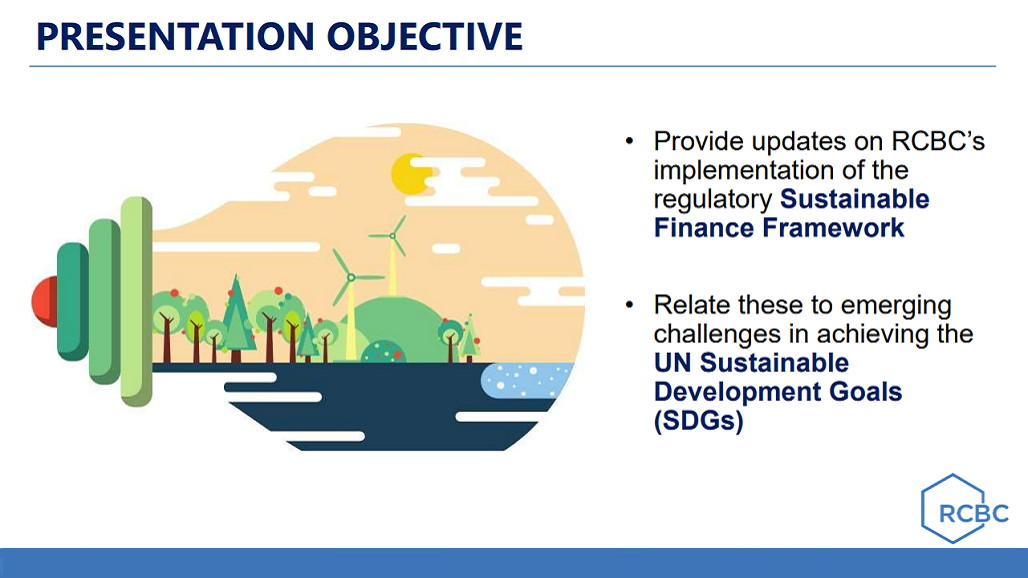ABA Position Paper on Cooperation in Achieving Sustainable Growth
Cooperation in Achieving Sustainable Growth

Paper Objective
Introduction:
(1) Action against Climate Change: Under BSP Circular 1085 and 1128, the BSP acknowledges that climate change could pose “significant and protracted implications on the bank’s operations and financial interest.” Climate risk can adversely affect financial institutions mainly through their lending activities as both physical risk and transition risk can weaken borrowers’ ability to repay loans.
- 2021 and 2022 Reports of the Secretary-General to the UN Economic and Social Council:
(2) Embedding awareness and embracing transparency:
Launch of Sustainability e-learning program.
The Sustainability e-learning program was developed as an annual exercise starting 2021. It serves as the immersion tool that helps RCBC employees, senior management, and Board of Directors understand the Bank’s role and the individual’s responsibility toward his/her community and environment.Climate change was the central theme in the pilot Sustainability elearning, with concepts such as greenhouse gas (GHG) emissions, carbon footprint, and low-carbon economy introduced throughout the material. Its completion by each member of RCBC seeks to promote the value of environmental protection and social responsibility as part of performance evaluation metrics, which is also required by BSP Circular 1085 and 1128.
Increased visibility to clients and suppliers.
Informative Sustainability leaflets were distributed to RCBC’s corporate clients and suppliers in 2021. These were aimed at promoting awareness of the effects of climate change and the need for environmental protection through activities that help reduce GHG emissions / carbon footprint.The materials also provide information on RCBC’s sustainable portfolio and its contribution to the UN SDGs to encourage the integration of sustainable practices into the operations of clients and suppliers. This kind of information dissemination is aligned with the provisions of BSP Circular 1128 enjoining banks to adopt an effective communication strategy to inform external stakeholders of the bank’s E&S strategic objectives and targets.
Enhanced reporting on sustainable finance.
RCBC continued to publish its Annual Sustainability Report (ASR) and Impact Report in compliance with regulatory requirements for publicly-listed companies and the Bank’s Sustainable Finance Framework.As in previous years, the Impact Report was released together with the Impact Report video which highlights the Bank’s commitment in supporting projects that have clear E&S benefits. Both the ASR and Impact Report were published with the theme “Innovations that Deliver” to demonstrate RCBC’s commitment to innovations that create value not only for the Bank’s customers and employees, but for society and the planet as well.Below are the significant information on the Bank’s sustainable portfolio that are contained in both reports and comply with the requirements of BSP Circular 1085 on sustainable finance(1) disclosures:
(3) Climate Risk Analysis: As climate change is a complex global concern that may significantly affect the financial health of banks, it is important to develop capabilities to understand its impact on a bank’s portfolio.
- In January 2021, RCBC entered into an advisory engagement with the International Finance Corporation (IFC) and 2 Degree Investing Initiative (2DII) for the use of the Paris Agreement Capital Transition Assessment (PACTA) tool and related methodology developed by 2DII.This advisory engagement for RCBC is the first to be conducted by IFC and 2DII in Asia. The results of the PACTA evaluation are based on climate scenarios and will provide an assessment of transition risk that will be reported to the BSP.
- In September 2021, RCBC became the first Philippine bank to participate in the Partnership for Carbon Accounting Financials (PCAF), an initiative among financial institutions worldwide to enable harmonized assessments and disclosures of GHG emissions financed by loans and investments. RCBC’s participation in PCAF is a decisive step in understanding the climate impact of the businesses that the Bank supports. As a PCAF participant, RCBC commits to disclose the GHG emissions of its portfolio within three years from joining the organization. The data can eventually be used as the foundation for emission reduction targets for a proper portfolio mix.
Prepared for the Asian Bankers Association by:

Armi M. Lamberte
First Vice President
Portfolio Quality Division
Risk Management Group
Rizal Commercial Banking Corp.
Juan Gabriel R. Tomas IV
Senior Vice President
Risk Management Group
Rizal Commercial Banking Corp.


